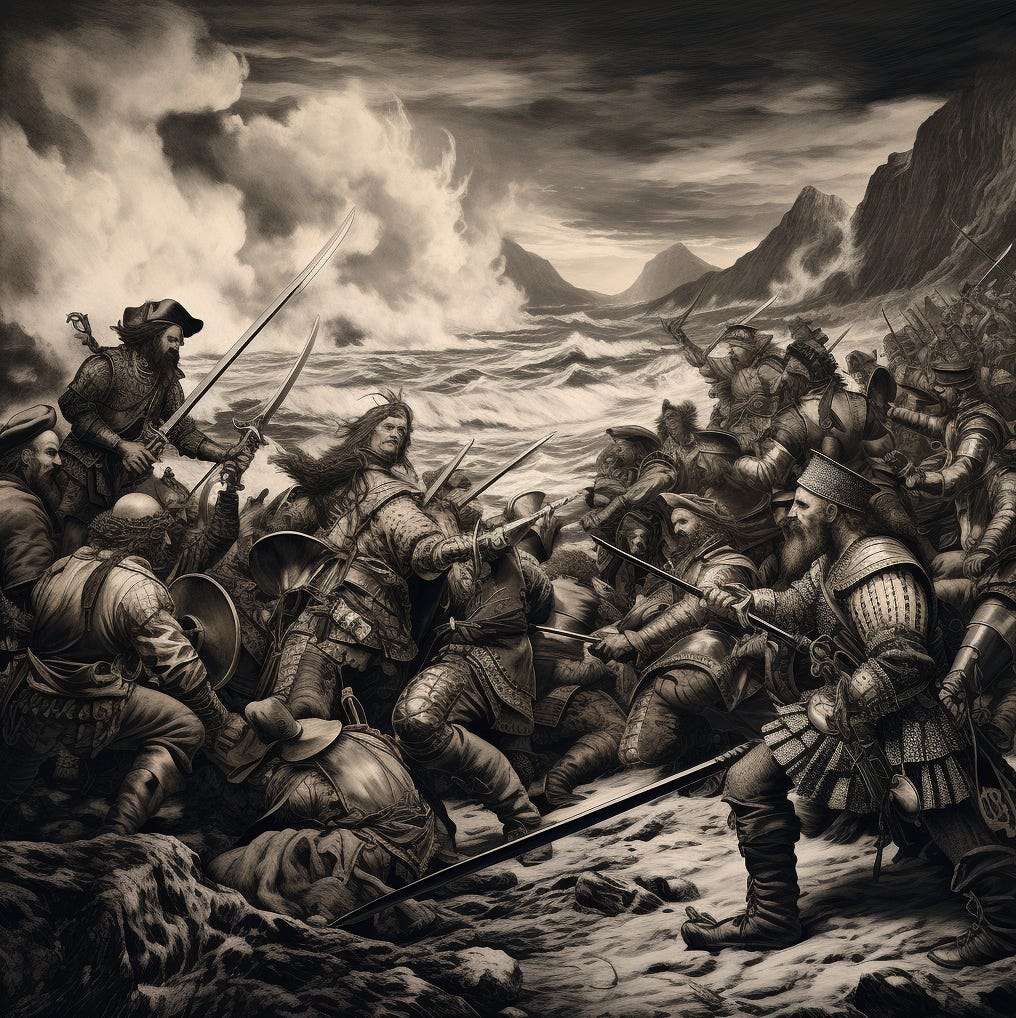Feuds of the Western Isles: MacNeill-MacLean War
Scottish history is steeped in tales of fierce rivalries, epic battles, and long-lasting conflicts between its clans. Among these legendary feuds, the conflict between the MacNeills and the MacLanes stands out as one of the most intense and enduring rivalries in the country's history. These two clans, both hailing from the western coast of Scotland, are steeped in a rich and complex history that spans centuries. This blog post delves into the origins, the peak of hostilities, and the eventual resolution of this age-old feud between the MacNeills and the MacLanes.
Origins of the Conflict: An Age-Old Feud
The roots of the MacNeill-MacLane conflict run deep into a complex web of political intrigue, territorial disputes, and personal animosities. Both clans had a strong presence in the Western Isles of Scotland, and their proximity led to inevitable clashes over land and power. One crucial factor in this feud was the involvement of both clans in the religious strife of the late 16th century. The MacLanes supported the Catholic cause, while the MacNeills leaned towards the Reformation. This religious divide deepened the rift between the clans, making them enemies on both political and personal fronts.
The MacLanes' Treacherous Alliance: The Holy League Campaign
At the heart of this conflict lay the MacLanes' treacherous alliance with Spanish and German mercenaries, collectively known as the Holy League, during a campaign against those who professed the Reformation. Led by Lauchlane MacLane of Dowart, the MacLanes committed a series of acts that were seen as acts of treason against the Crown. Their collaboration with foreign forces against fellow Scots was a deeply divisive issue. Their participation in the Holy League campaign was a pivotal moment in the feud. Their violent actions, including the siege of Ardnamurchan, showed their utter disregard for the King's authority and the laws of the land. This campaign solidified the enmity between the MacNeills and the MacLanes, creating a legacy of animosity that would persist for generations.
The Burnings of MacNeills' Lands: Scorched Earth and Bitter Memories
One of the most notorious acts of aggression during the feud was the burning of MacNeill lands. The MacLanes, along with their foreign allies, mercilessly set fire to the lands of Canna, Rum, Eg, and Eilean Muck, causing immense destruction and hardship to the MacNeill clan. These incidents left a deep scar on the MacNeills and further stoked the flames of animosity between the two clans. The burning of these lands was both a tactical move and a deep personal affront, as it not only diminished the MacNeills' power but also served as a brutal message of vengeance.
Angus MacNeill's Struggles: Defending Honor and Clan
Amid these conflicts, Angus MacNeill of Dinnievaig found himself at the center of the storm. He was a key figure in the MacNeill clan's struggle against the MacLanes and their foreign allies. Angus's efforts to defend his clan's territory and uphold their honor were instrumental in continuing the fight. The feud became deeply personal for Angus, as he sought retribution for the wrongs committed against his family and people. Angus MacNeill's unwavering dedication to his clan's cause made him a symbol of resistance and defiance against the MacLanes' tyranny.
The Law and Its Consequences: The King's Authority Challenged
In response to the transgressions of the MacLanes and their allies, the law was brought to bear on Lauchlane MacLane of Dowart and his cohorts. The Act of Parliament stated that such acts of violence and treason should be met with the ultimate punishment: forfeiture of life, land, and goods. It was a declaration of the seriousness with which the King and his council viewed these crimes. The involvement of the King became a turning point in the feud. The Crown's authority was challenged by the actions of the MacLanes and their allies, who flouted the law and engaged in treasonous activities. The Crown took action to bring the perpetrators to justice, leading to the imprisonment of Lauchlane MacLane of Dowart and his accomplices.
The MacNeill-MacLane Conflict Spreads: Communities in Turmoil
As the feud escalated, it began to affect not only the MacNeills and the MacLanes but also the surrounding communities. The feud led to turmoil and suffering among the common people who were caught in the crossfire. This further intensified the desire to bring an end to the hostilities. Innocent bystanders found themselves living in constant fear as the conflict spread beyond the two clans, illustrating the far-reaching consequences of a longstanding feud.
Resolution and Lessons: Healing Old Wounds
In the end, the MacNeill-MacLane feud came to a conclusion through a combination of intervention by the Crown and the realization that the ongoing conflict was causing great suffering. The imprisonment of key figures in the MacLane clan played a significant role in ending the hostilities. The conflict between the MacNeills and the MacLanes serves as a stark reminder of the intense rivalries and animosities that often characterized Scottish history. It highlights the destructive consequences of religious and political divisions, as well as the lasting impact of feuds on both individuals and communities.
The feud between these two clans ultimately serves as a cautionary tale, illustrating the importance of justice, the rule of law, and the need to find resolution rather than perpetuate long-standing animosities. It is a testament to the enduring power of reconciliation and the potential for healing even the deepest historical wounds.
Conclusion: Lessons from History
The conflict between the MacNeills and the MacLanes is a compelling chapter in Scottish history, replete with political intrigue, religious divisions, and personal rivalries. It underscores the tragic consequences of long-standing feuds on communities and individuals, while also offering hope in the power of justice and reconciliation to bring about resolution. The MacNeill-MacLane feud serves as a lesson from history, reminding us of the importance of finding peaceful solutions to conflicts that threaten to tear apart the fabric of society.





